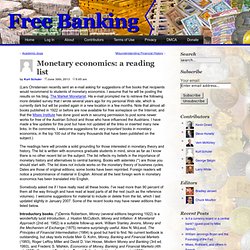

Ebooks. Exploring General Equilibrium: Fischer S. Black, Edward L. Glaeser: 9780262514095: Amazon.com. The Loudest Voice in the Room: How the Brilliant, Bombastic Roger Ailes Built Fox News. What If? Writing Exercises for Fiction Writers (3rd Edition): Anne Bernays, Pamela Painter: 9780205616886: Amazon.com. Myths to Live by (Condor Books): Joseph Campbell: 9780285647312: Amazon.com. The Triple Thinkers: Edmund Wilson: 9780374513221: Amazon.com. In the Loop: Don DeLillo and the Systems Novel: Tom LeClair: 9780252014833: Amazon.com. Alienation: Richard Schacht: 9780041500349: Amazon.com. Applied Predictive Modeling: Max Kuhn, Kjell Johnson: 9781461468486: Amazon.com. Dynamic Optimization, Second Edition: The Calculus of Variations and Optimal Control in Economics and Management (Dover Books on Mathematics): Morton I. Kamien, Nancy L. Schwartz: 9780486488561: Amazon.com.
Recursive Models of Dynamic Linear Economies (The Gorman Lectures in Economics): Lars Peter Hansen, Thomas J. Sargent: 9780691042770: Amazon.com. The Euro Trap: On Bursting Bubbles, Budgets, and Beliefs: Amazon.co.uk: Hans-Werner Sinn. This book offers a critical assessment of the history of the euro, its crisis, and the rescue measures taken by the European Central Bank and the community of states.

The euro induced huge capital flows from the northern to the southern countries of the Eurozone that triggered an inflationary credit bubble in the latter, deprived them of their competitiveness, and made them vulnerable to the financial crisis that spilled over from the US in 2007 and 2008. As private capital shied away from the southern countries, the ECB helped out by providing credit from the local money-printing presses. The ECB became heavily exposed to investment risks in the process, and subsequently had to be bailed out by intergovernmental rescue operations that provided replacement credit for the ECB credit, which itself had replaced the dwindling private credit.
The Secret Club That Runs the World: Inside the Fraternity of Commodities Traders eBook: Kate Kelly: Amazon.co.uk: Kindle Store. Fragile by Design: The Political Origins of Banking Crises and Scarce Credit (The Princeton Economic History of the Western World) eBook: Charles W. Calomiris, Stephen H. Haber: Amazon.co.uk: Kindle Store. Calomiris and Haber tackle a very ambitious project here.

They seek to do three things. First they offer a concise survey of the history of banking. Second, they advance a theory to explain why some countries have had much more stable banking systems than others. Third they attempt to use this theory to explain the recent financial crisis in the U.S. In my opinion, they succeed brilliantly in most of the historical summary. Everyone's views about banking regulation are grounded in their personal opinions about economics and politics. Textbook.pdf. Web.ics.purdue.edu/~drkelly/DFWKenyonAddress2005.pdf.
The Oxford Handbook of the Economics of Gambling (Oxford Handbooks): Leighton Vaughan Williams, Donald S. Siegel: 9780199797912: Amazon.com. Ptgmedia.pearsoncmg.com/images/9780789743145/samplepages/0789743140.pdf. People.ischool.berkeley.edu/~hal/Papers/2013/ml.pdf#%21. The Second Machine Age: Work, Progress, and Prosperity in a Time of Brilliant Technologies: Erik Brynjolfsson, Andrew McAfee: 9780393239355: Amazon.com. Ninety Percent of Everything: Inside Shipping, the Invisible Industry That Puts Clothes on Your Back, Gas in Your Car, and Food on Your Plate: Rose George: 9780805092639: Amazon.com. Command and Control: Nuclear Weapons, the Damascus Accident, and the Illusion of Safety: Eric Schlosser: 9781594202278: Amazon.com. The Lives of the Novel: A History: Thomas G. Pavel: 9780691121895: Amazon.com.
Fiction. Free Banking and Monetary Reform: David Glasner: 9780521022514: Amazon.com. Invisibles: The Power of Anonymous Work in an Age of Relentless Self-Promotion eBook: David Zweig. Misunderstanding Financial Crises: Why We Don't See Them Coming: Gary B. Gorton: 9780199922901: Amazon.com. The Org: The Underlying Logic of the Office: Amazon.co.uk: Ray Fisman, Tim Sullivan. It is no understatement to say that the business book market is saturated.

Most of it is not nearly of the quality that I would comfortably hand or recommend those books to MBA students; which is incredible since MBA students and alumni are invariably the target market for such books. Most of those books steer clear of sensible economic theory and also the use of non-anecdotal evidence which does not help one bit. But there are books worth recommending and they lie on a frontier. They can be classified along two dimensions. The first is the probability that what is contained in the book is actually correct; which can be high or low. The Org by Ray Fisman and Tim Sullivan falls well into the required reading for MBAs set. The trade-off for being rigorous is that you do not get to put forward a speculative hypothesis about the evolution of organisations and the way managers should manage in the future. Mass Flourishing - How Grassroots Innovation Created Jobs, Challenge, and Change: Amazon.fr: Edmund Phelps: Livres anglais et étrangers.
Worldly Philosopher: The Odyssey of Albert O. Hirschman: Jeremy Adelman: 9780691155678: Amazon.com. The American Illness: Essays on the Rule of Law: F. H. Buckley: 9780300175219: Amazon.com. China Goes Global: The Partial Power: David Shambaugh: 9780199860142: Amazon.com. Central Banks and Financial Markets: The Declining Power of Us Monetary Policy: Hasan Cömert: 9781781004043: Amazon.com. End of Power: From Boardrooms to Battlefields and Churches to States, Why Being In Charge Isn’t What It Used to Be: Amazon.co.uk: Moises Naim. Whatever our political ideologies, most of us are aware that we've entered one of those periods of accelerated change that mark the transition from one historical era to another.

In the last dozen years we've had the War on International Terror, the Great Recession, public and private sector financial collapses, and a change in politics that has shifted the country from ultra-laissez faire economic conservatism toward a slightly left-of-center regime of higher taxes, more regulation, and more federally-supervised healthcare. These changes may be viewed through many economic and political prisms. This book views it through what is purported to be a change in the power structures that govern politics, business, the military, and even religion.
As author Moises Naim posits: "Power is decaying. To put it simply, power no longer buys as much as it did in the past. " Something along these lines did happen on a limited scale. Free Banking » Monetary economics: a reading list. (Lars Christensen recently sent an e-mail asking for suggestions of five books that recipients would recommend to students of monetary economics.

I assume that he will be posting the results on his blog, The Market Monetarist. His e-mail prompted me to retrieve the following more detailed survey that I wrote several years ago for my personal Web site, which is currently dark but will be posted again in a new location in a few months. Note that almost all books published in 1922 or before are now available for free someplace on the Internet, and that the Mises Institute has done good work in securing permission to post some newer works for free of the Austrian School and those who have influenced the Austrians. I have made a few updates for this post but have not updated all the links or inserted many new links.
In the comments, I welcome suggestions for very important books in monetary economics, in the top 100 out of the many thousands that have been published on the subject.)